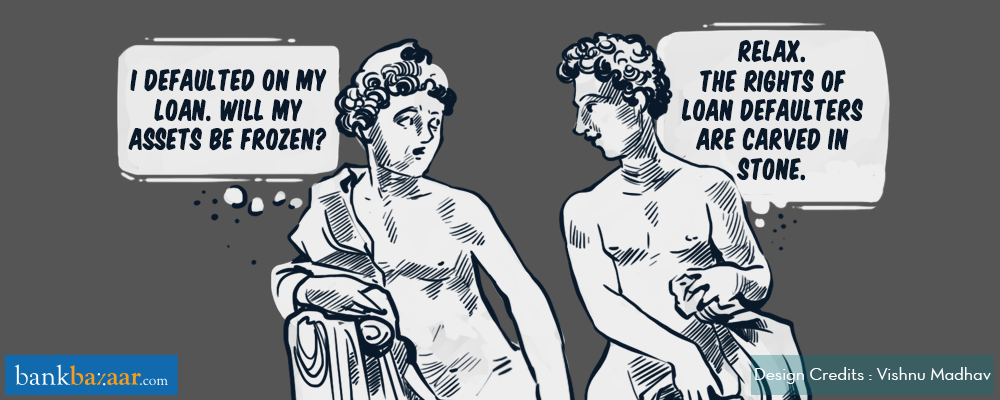While navigating a loan default can be challenging, understanding your rights and available options empowers you to make informed decisions. Here’s everything you need to know if you find yourself in this predicament.

Repaying a loan and managing EMIs can sometimes become a challenging endeavour, potentially leading to concerns about defaulting. While defaulting is not an ideal situation, it’s important to recognise that it doesn’t mark the end of the road, nor does it brand you as a criminal. In this article, we’ll explore the rights and options available to borrowers who find themselves in this predicament.
Understanding Loan Restructuring
If you’re grappling with the challenges of loan repayment, it’s reassuring to know that banks have provisions for loan restructuring. This involves various methods, with one common approach being the extension of the loan tenure. By elongating the repayment period, EMIs become more manageable. However, restructuring is contingent on the bank deeming the default reason genuine, with guidelines set by the Reserve Bank of India (RBI). For instance, the loan tenure extension is generally limited to a maximum of one year.
Additional Reading: Car Loan Default – All You Need To Know
Protecting Your Assets
The fear of losing assets, such as a house or car, can be overwhelming for borrowers facing financial difficulties. Banks acknowledge that genuine reasons, like job loss or unexpected health issues, may contribute to loan defaults. In such cases, banks are more likely to consider solutions that are mutually acceptable, preserving the borrower’s asset and preventing it from becoming a non-performing asset (NPA).
Options for Borrowers
1. Rescheduling Debt
Banks may opt to reschedule your debt by extending the loan tenure, reducing your monthly EMI commitment. While this may result in higher long-term interest payments, it provides immediate relief during challenging times.
2. Deferring Payments
Borrowers anticipating an improvement in cash flow, perhaps due to a job change, can seek temporary relief by deferring payments. The bank may permit this, though a penalty for delayed payment may be imposed.
3. One-Time Settlement
For borrowers with available funds, a one-time settlement option might be considered. The settlement amount is often lower than the original sum, with potential waivers on certain charges. Bankruptcy could be an extreme measure if financial conditions are dire.
4. Conversion of Unsecured Loans
Borrowers with unsecured loans can explore converting them into secured loans by offering collateral. This reduces the interest rate and, consequently, the EMI burden.
Rights of the Borrower
Borrowers facing default have several rights protected under the Securitisation and Reconstruction of Financial Assets and Enforcement of Security Interest (SARFAESI) Act:
1. Right to Notice
Banks must issue a notice giving a 60-day window before repossession, allowing borrowers time to settle dues.
2. Right to be Heard
Borrowers can file representations and objections within the one-month notice period, with the bank required to respond with valid reasons for rejecting objections.
3. Right to Fair Value
The bank must provide a fair value notice alongside the auction notice, allowing borrowers to contest the assessed sale price.
4. Right to Balance
After settling the loan through asset sale, borrowers are entitled to any surplus amount, as the bank relinquishes claims on it.
5. Right to be Treated Politely
Banks must adhere to a code of conduct, treating defaulters respectfully, with polite requests for meetings and specific time constraints.
Additional Reading: Home Loan Default – How To Handle One
Consequences of Loan Default
While rights and options exist, it’s essential to recognise the potential consequences of loan default. Seizure and auction of assets, a plummeting Credit Score, and difficulties obtaining future loans and Credit Cards are all potential outcomes. Rescheduling debt may also impact your credit history. Thus, it’s crucial to assess your financial capacity before taking on loans.
Navigating a loan default can be challenging, but understanding your rights and available options empowers you to make informed decisions. Proactive communication with the bank, exploring restructuring possibilities, and being aware of your rights can help mitigate the impact of a default and pave the way for a financial recovery. Remember, facing financial challenges is a shared experience, and seeking assistance early on is a proactive step toward a more secure financial future.
Feel ready for a Personal Loan? Explore options at BankBazaar starting at EMIs of just ₹2,149 per lakh* with instant approval via a hassle-free digital process.